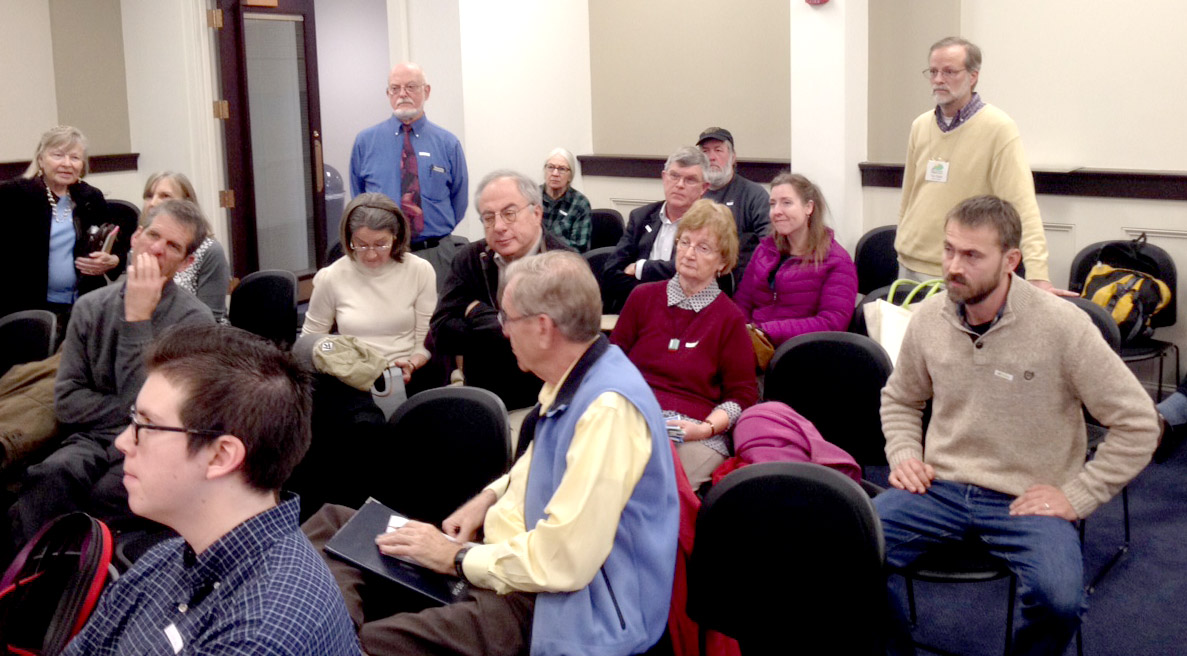Economic benefits of clean energy described at hearing
A Renewable and Efficiency Portfolio Standard (REPS) in Kentucky would create jobs, save money, improve public health and invigorate the economy members of the House Economic Development Committee were told Thursday morning.
REPS are the “impetus for tremendous economic growth in states that have adopted those policies,” said Randy Strobo, an adjunct professor of environmental law and policy at Bellarmine University’s School of Environmental Studies. “This proposal opens the door for Kentuckians to benefit … from one of the fastest growing sections in the U.S. economy.”
 Concrete evidence of the benefits of REPS was provided by Daniel Brookshire, a regulatory and policy analyst with the North Carolina Sustainable Energy Association. He described the benefits in job creation, economic growth and the impact on ratepayers since North Carolina passed REPS in 2007.
Concrete evidence of the benefits of REPS was provided by Daniel Brookshire, a regulatory and policy analyst with the North Carolina Sustainable Energy Association. He described the benefits in job creation, economic growth and the impact on ratepayers since North Carolina passed REPS in 2007.
“Between 2007 and 2014, $6 billion has been invested in clean energy in the state, much invested in poorer counties,” he said noting that communities have experienced $1.54 in benefits for each $1 invested. This effort has resulted in $7 billion in revenue and 20,000 full-time jobs for North Carolinians.
“There’s some really good things that can come out of [clean energy legislation] if we approach it like North Carolina did … by focusing on and giving priority to low-income areas for jobs and energy savings. And for here, there’s the benefit to those who have been most effected by extraction and it’s health effects, and the effects of a mono-economy.”
– Jacob Mack-Boll, Knott County
“The job numbers have steadily grown over time and the revenues have skyrocketed over time,” Brookshire said. “The North Carolina REPS has injected a new market for electricity production this market has resulted in … projects that are investing millions of dollars in the poorest parts of our state.
“Clean energy stays very localized in its destination markets. Forty-six percent of the clean energy products that were generated in the state stayed within county level – so local businesses doing local economic development work – and 35 percent of that stayed within the state.
“Over time it is projected that our REPS standards will save ratepayers $651 million between 2008 and 2029 compared to what would have been done in a conventional setting,” Brooksire added.
For several years Rep. Mary Lou Marzian has sponsored the Clean Energy Opportunity Act that is modeled largely after North Carolina’s REPS. The bills have been sent to unfavorable committees as an energy bill.
However, Economic Development Committee Chair Rep. Ruth Ann Palumbo recognizes the legislation as a jobs bill and called for Thursday’s hearing in her committee. The bill is expected to be filed in the next few days and it is unknown to what committee it will be assigned.
“This is something that will help our families, children and our workers,” said Marzian. She noted that a solar manufacturing plant in Danville recently moved out of state “because we did not have a policy to help them survive.”
“These are jobs Kentucky can no longer afford to miss out on,” said Strobo, who was testifying for the Kentucky Conservation Committee.
√ with Kentucky Interfaith Power and Light on Tuesday, March 1
√ with the Kentucky Student Environmental Coalition on Wednesday, March 9
Several committee members, including Rep. Dennis Horlander from Louisville, spoke favorable about the opportunities offered by renewable energy. Comments from Reps. John Short and Kim King were less favorable.
Just prior to hearing of the clean energy opportunities, the committee approved a bill by Rep. Rocky Adkins allowing coal companies to benefit from an economic incentive program.
Earlier in the day, members of the Kentucky Student Environmental Coalition planted pinwheels on the lawn outside of the Capitol Annex to represent support for the renewable energy legislation.
Watch the KET recording of the committee hearing HERE (the clean energy testimony begins about 21 minutes in).
Recent News
Kentucky’s past legislative session showed alarming trend toward government secrecy
Churchill Downs takes more than it gives. That's why the Kentucky Derby is a no-go for me
‘We must never forget.’ Kentucky town installs markers for lynching victims.
Featured Posts
Protecting the Earth
TJC Rolling Out The Vote Tour – a KFTC Reflection Essay
KFTC Voter Empowerment Contractor Reflection Essay
Archives
- Home
- |
- Sitemap
- |
- Get Involved
- |
- Privacy Policy
- |
- Press
- |
- About
- |
- Bill Tracker
- |
- Contact
- |
- Links
- |
- RSS

